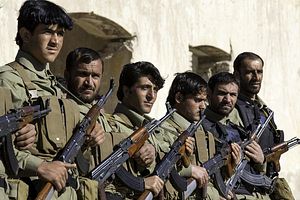The Afghan government is deliberating whether to expand a U.S. funded pro-government militia force, known as the Afghan Local Police (ALP). The ALP, deployed in 29 of 34 provinces, has a mixed track record in stemming Taliban attacks and has been repeatedly accused of human rights violations.
Afghanistan’s President Ashraf Ghani is considering adding 15,000 more militiamen to the force’s roster — upping the fighting strengths from approximately 29,000 to 45,000 men –and is seeking American tax dollars to fund the program past its expiration date in September 2018.
The Brussels-based International Crisis Group (ICG), however, offers a succinct answer in this ongoing policy debate on the ALP in Kabul: “The ALP and pro-government militias are cheap but dangerous, and Kabul should resist calls for their expansion.”
The principal idea behind the U.S.-backed militia program was to have locals take charge of community security and engage the Taliban instead of the regular Afghan National Security Forces, which often were perceived as outsiders due their different tribal, ethnic, or urban background.
In the past years, ALP units have borne the brunt of the fighting, with casualty rates three to six times higher than that of the regular Afghan army and police force. However, not all of this can be attributed to the Taliban, as ALP militias have killed civilians and committed fraud, theft, rape, kidnapping, drug trafficking, and extortion.
“Teachers who feel outraged by ALP behavior and pick up guns to attack an ALP outpost may have no connection to insurgents and may quickly return peacefully to civilian life. Such cases illustrate how ALP can inspire conflict, instead of quelling it,” the ICG report explains.
“Among grisly reports of abuses, a local doctor told us that an ALP commander executed 45 prisoners, including a suspected Taliban militant who was blindfolded and used as target practice for rocket-propelled grenades. In short, the ALP are often bandits who prey upon the people they are supposed to be protecting,” Graeme Smith, an ICG analyst, observes.
Of course, the report is careful to point out that some ALP units contribute to community security, particularly “where local factors allow recruitment of members from the villages they patrol and where they respect their own communities. But such conditions do not exist in many districts.”
Interestingly, in the five provinces without ALP units present, violence decreased by 27 percent between 2010 and 2014, whereas violent incidents rose by 14 percent throughout Afghanistan in the same time period. Yet Kabul is currently in the process of raising about 5,000 additional militiamen in at least seven provinces, the ICG report states.
Despite its criticism, the ICG cautions that abruptly halting the program “would give insurgents a military edge, and ex-fighters might also be drawn to banditry and other forms of lawlessness if not carefully reintegrated into society or the ANSF.” At the same time, ICG is emphatic that the expansion of the force would be a mistake.
What are the group’s recommendations?
In short, slowly ending the program while integrating units with a good track record into the ANSF and stepping up training, vetting and discipline. “Only a minority of the existing ALP would likely pass muster in such a stringent system, but those remaining should receive pay increases equivalent to those received by the national police (ANP), and adequate support from the government and international community,” the ICG concludes.

































